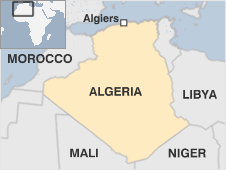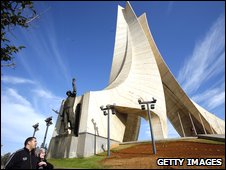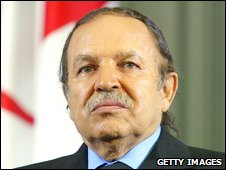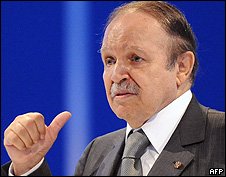Generic Medicines
Taj Pharma is the largest generic pharmaceutical company in India. We hold top positions in different established markets worldwide generics markets..
Algeria, a gateway between Africa and Europe, has been battered by violence over the past half-century.
More than a million Algerians were killed in the fight for independence from France in 1962, and the
 |
country has recently emerged from a brutal internal conflict that followed scrapped elections in 1992.
The Sahara desert covers more than four-fifths of the land. Oil and gas reserves were discovered here in the 1950s, but most Algerians live along the northern coast. The country supplies large amounts of natural gas to Europe and energy exports are the backbone of the economy.
AT A GLANCE
 Politics: President Bouteflika led his country out of the civil war that broke out when Islamists were denied an election victory; since the 1990s, the Islamist insurgency has been replaced by Al-Qaeda-inspired militants carrying out a deadly bombing campaign
Economy: Algeria is a key oil and gas supplier
International: Tension persists between Algeria and Morocco over the Western Sahara, where nomadic Saharans are seeking self-determination
|
Algeria was originally inhabited by Berbers until the Arabs conquered North Africa in the 7th century. Staying mainly in the mountainous regions, the Berbers resisted the spreading Arab influence, managing to preserve much of their language and culture. They make up some 30% of the population.
Part of the Turkish Ottoman empire from the 16th century, Algeria was conquered by the French in 1830 and was given the status of a "departement". The struggle for independence began in 1954 headed by the National Liberation Front, which came to power on independence in 1962.
In the 1990s Algerian politics was dominated by the struggle involving the military and Islamist militants. In 1992 a general election won by an Islamist party was annulled, heralding a bloody civil war in which more than 150,000 people were slaughtered.
An amnesty in 1999 led many rebels to lay down their arms.
Although political violence in Algeria has declined since the 1990s, the country has been shaken by by a campaign of bombings carried out by a group calling itself Al-Qaeda in the Land of Islamic Maghreb (AQLIM).
The group was formerly known as the Salafist Group for Call and Combat, and has its roots in an Islamist militia involved in the civil war in the 1990s.
Although experts doubt whether AQLIM has direct operational links with Osama Bin-Laden, its methods - which include suicide bombings - and its choice of targets, such as foreign workers and the UN headquarters in Algiers, are thought to be inspired by Al-Qaeda. North African governments fear that local Islamist groups in Algeria, Morocco and Tunisia may be linking up under the umbrella of the new movement.
After years of political upheaval and violence, Algeria's economy has been given a lift by frequent oil and gas finds. It has estimated oil reserves of nearly 12 billion barrels, attracting strong interest from foreign oil firms.
However, poverty remains widespread and unemployment high, particularly among Algeria's youth. Endemic government corruption and poor standards in public services are also chronic sources of popular dissatisfaction.
In 2001 the government agreed to a series of demands by the minority Berbers, including official recognition of their language, after months of unrest involving Berber youths demanding greater cultural and political recognition.
President: Abdelaziz Bouteflika
Abdelaziz Bouteflika won the presidency in 1999 polls with the backing of the army, promising to end violence with Islamist rebels that exploded after the cancellation of a parliamentary election in 1992 that an Islamic party was set to win.

President Bouteflika has focused on national reconciliation
|
Since then he secured landslide election victories in 2004 and again 2009. After having amended the constitution to remove the two-term limit on the presidency in November 2008, Bouteflika has effectively allowed himself to remain head of state for life - changes which some say represent a setback for democratic reform.
On first taking office in 1999 he promised to restore national harmony and to end years of bloodshed.
He released thousands of Muslim militants and won backing for a civil concord in 1999 which offered an amnesty to armed militants.
Many of the rebels accepted and the violence declined. Voters backed a second amnesty for the remaining militants, laid out in the president's "charter for peace and reconciliation", in a 2005 referendum.
Algeria under President Bouteflika has won praise from the West for backing the US-led "war on terror". At home, many credit him with the return of security, though attacks by Islamist militants have increased again since 2006.
Mr Bouteflika has overcome years of isolation for Algeria, welcoming a succession of foreign heads of state and government to Algiers, but his socialist-orientated economic policies have failed to wean the economy off reliance on oil and gas.
A veteran of the war for independence from France, Mr Bouteflika was Algeria's foreign minister for 16 years until 1979. He went into self-imposed exile for several years in the 1980s to escape corruption charges that were later dropped.
Power is concentrated in the presidency, with parliament considered a rubber-stamp body. Mr Bouteflika is widely credited with normalising the presidency's ties with the military, which has played a key role under a state of emergency which has been in place since 1992.
Algeria's television and radio stations are state-controlled, but there is a lively private press which often criticises the authorities.
There is no direct censorship, but laws set out prison terms and fines for insulting or defaming the president, MPs, judges and the army.

President Bouteflika has focused on reconciliation
|
Media rights bodies have accused the government of using the laws to control the private press.
Algerian dailies mark the anniversary of the introduction of the defamation laws by suspending publication in a protest known as a "day without newspapers".
Satellite TV is popular; stations based in France target viewers in Algeria and European channels are widely-watched.
Algeria can be a dangerous environment for media workers; 57 journalists were murdered between 1993-97. Most of the killings were blamed on armed Islamist groups.
Most internet users rely on dial-up connections and cybercafes. Access is not restricted, but users and ISPs can be prosecuted over material deemed to be offensive or harmful to public order.
Writing in Arabic, English and French, Algerian bloggers cover social, cultural and political topics. There are more than 5,000 Algerian blogs, a newspaper suggested in late 2008.
The press:
Television:
Radio:
News agencies:
Agence Algerienne d'Information (AAI) - private
AFRICA | ASIA-PACIFIC | AMERICAS | EUROPE | MIDDLEEAST | SOUTHASIA
![]()
![]()
![]()
Mauritania Mauritius Morocco Mozambique Namibia Niger Nigeria Republic-of-congo Rwanda Sao-tome-and-principe Senegal Seychelles Sierra-leone Somalia South-africa Sudan Swaziland Tanzania The-gambia Togo Tunisia Uganda Australia Brunei Burma Cambodia China East-timor Fiji Indonesia Japan Kazakhstan Kiribati Kyrgyzstan Laos Malaysia Marshall-islands Micronesia Mongolia Nauru New-zealand North-korea Palau Papua-new-guinea Samoa Singapore Solomon-islands South-korea Taiwan Tajikistan Thailand The-philippines Tonga Turkmenistan Tuvalu Uzbekistan Vanuatu Vietnam Antigua-and-barbuda Belize Bolivia Brazil Canada Chile Colombia Costa-rica Cuba Dominica Dominican-republic Ecuador El-salvador Grenada Guatemala Guyana Haiti Honduras Jamaica Mexico Nicaragua St-kitts-and-nevis St-lucia Suriname Trinidad-and-tobago Uruguay Venezuela Albania Andorra Armenia Austria Azerbaijan Belarus Belgium Bosnia-hercegovina Bulgaria Croatia Cyprus Czech-republic Denmark Estonia Finland France Georgia Germany Greece Hungary Iceland Ireland Italy Latvia Liechtenstein Lithuania Luxembourg Macedonia Malta Moldova Monaco Montenegro Norway Poland Portugal Russia San-marino Serbia Slovakia Slovenia Spain Sweden Algeria Egypt Iran Iraq Israel-and-palestinian-territories Jordan Kuwait Lebanon Libya Mauritania Oman Saudi-arabia Sudan Syria Tunisia United-arab-emirates Yemen Afghanistan Bangladesh Bhutan India Nepal Pakistan Sri-Lanka The-Maldive